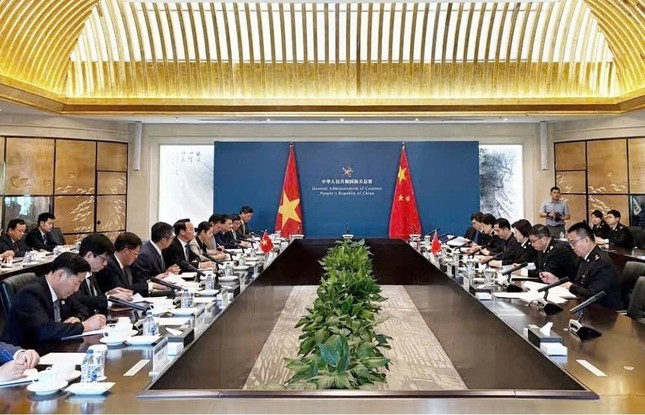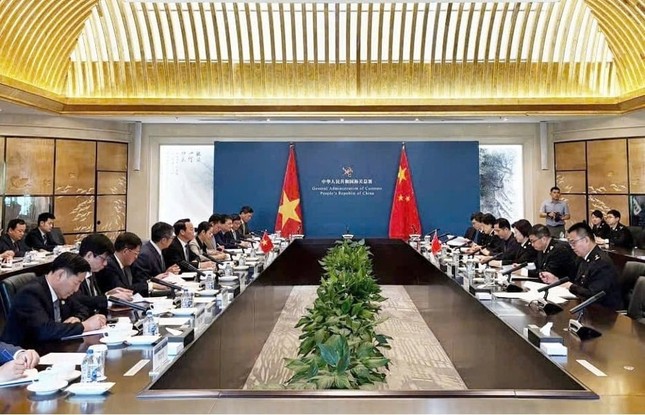From May 27-29, a delegation from the Ministry of Agriculture and Environment (MAE), led by Minister Du Do Duc, worked with the General Administration of Customs of China to address challenges faced by Vietnamese exporters of agricultural and aquatic products, particularly durian, and to prepare for the upcoming lychee export season.
During this visit, Minister Du Do Duc held talks with Sun Mei Jun, the head of the General Administration of Customs of China.
The discussions resulted in a consensus on several solutions to enhance trade cooperation and market access for agricultural and aquatic products from both countries. Specifically, both sides agreed to cooperate closely to resolve issues related to the import and export of agricultural and aquatic products, with an immediate focus on facilitating Vietnamese durian exports to China and ensuring smooth lychee exports this year.

Minister Du Do Duc leads the delegation to the General Administration of Customs of China. Source: ICD.
The two sides agreed to work together to promote trade and market access for Vietnamese agricultural and aquatic products in China. This includes instructing technical teams from both sides to expedite negotiations, finalize procedures, and promptly sign protocols related to the export of agricultural and aquatic products.
Additionally, they considered the possibility of establishing an annual ministerial-level meeting mechanism between the MEA and the General Administration of Customs of China to strengthen cooperation and timely address any challenges in agricultural and aquatic product trade.
During the talks, the leaders also agreed to promote cooperation in agricultural trade and market access in the coming years. This includes establishing a “green channel” for agricultural products, prioritizing expedited clearance at border gates for fresh fruit during peak harvest seasons, and extending working hours at border gates during the season (including weekends and after-hours) to meet the increased clearance demand.
China will soon send a delegation to inspect Vietnamese grapefruit and lemon farms with the aim of drafting an export protocol. The two sides will also finalize procedures to sign a protocol on the export of Vietnamese wild-caught and live aquatic products to China. They will consider signing new protocols to replace those that have expired and are no longer aligned with the current situation. Both sides agreed to establish a rotational, annual ministerial-level meeting mechanism and a joint working group on food safety and quality control to facilitate cooperation and timely address any issues that may arise.
Vietnam has resolved all issues related to the export of sturgeon and pet food from China to Vietnam.
During this visit, the delegation also explored cooperation opportunities by visiting and working with the New Development Agricultural Products Distribution Center, one of the largest importers and distributors of agricultural products in China.
Additionally, Minister Du Do Duc met with the China Supply and Marketing Group, a large-scale agricultural distribution conglomerate in China. With nearly 200 billion yuan in total assets, the group has 11 subsidiaries and 32,800 employees engaged in various fields, including fertilizer and pesticide operations, grain reserve and trade services, cotton trading and services, and the distribution of agricultural products.
These visits to agricultural product distribution centers, wholesale markets, and companies/conglomerates in the agricultural sector will lay the foundation for local businesses and provinces to seek cooperation and investment opportunities in agriculture.
In recent years, the cooperation between the MEA (formerly the Ministry of Agriculture and Rural Development) and the General Administration of Customs of China has been continuously strengthened and substantiated, especially during the complex developments of the Covid-19 pandemic. The two sides have worked closely together to ensure uninterrupted trade of agricultural and aquatic products between the two countries. They have also flexibly applied online evaluation methods and indirect protocol signing processes to open up markets for products such as black jelly, bird’s nest, durian, and dragon fruit.
According to statistics from the Vietnam Customs, in 2024, the trade turnover of agricultural, forestry, and aquatic products between Vietnam and China reached 17.8 billion USD, an increase of 14.6% compared to 2023. Exports of agricultural, forestry, and aquatic products to the Chinese market reached 13.5 billion USD, up 14.3% over the same period in 2023, while imports were estimated at 4.3 billion USD, up 21% over the same period in 2023. The trade turnover of agricultural, forestry, and aquatic products between Vietnam and China in the first four months of 2025 is estimated at 5.07 billion USD, up 3.7% compared to the same period in 2024.
Up to now, the two sides have signed 28 Memorandums of Understanding/Protocols on the import and export of agricultural, forestry, and aquatic products between the two countries, reflecting the close cooperation and efforts of both sides. Many Vietnamese agricultural and aquatic products are now exported to China, including 15 types of fruits and vegetables (watermelon, mangosteen, black jelly, durian, fresh banana, sweet potato, chili, passion fruit, dragon fruit, jackfruit, mango, lychee, longan, and custard apple); crocodile, captive-bred monkey, bird’s nest, fish meal, and some products for production and processing of animal feed; dairy products and aquatic products of all kinds.
“Vietnamese Agricultural Products Synced with Chinese E-commerce Platforms”
The Vietnamese agricultural products store on Chinese e-commerce and social media platforms will operate under a “goods-seeking-people” model. This innovative approach empowers Vietnamese suppliers to sell directly to Chinese consumers and establish their branded products in the Chinese market.



















